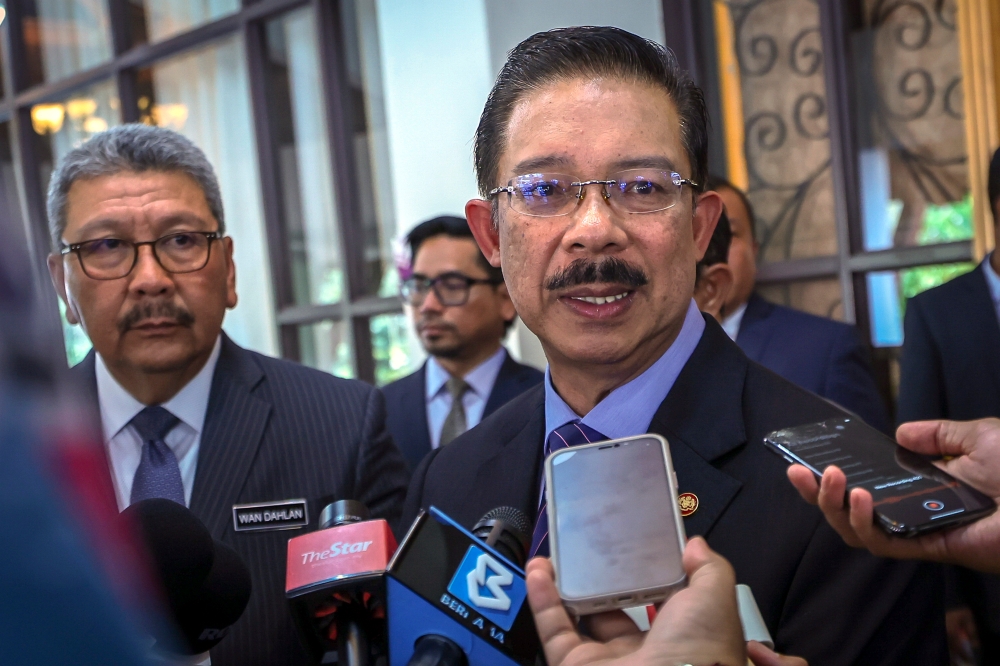FEBRUARY 26 — Chief Secretary to the Government (KSN) Tan Sri Mohd Zuki Ali on Saturday (Feb 24) clarified that the authority to appoint and terminate the services of the Malaysia Tourism Promotion Board (MTPB) director-general (DG) Datuk Ammar Abd Ghapar rests with the Minister of Tourism, Arts and Culture.
He explained that this matter is clearly outlined in the Malaysia Tourism Promotion Board Act 1992 (Act 481).

Section 3 of Act 481 establishes the MTPB while section 4 sets out its functions and powers. Section 5 then provides for membership of the MPTB.
Members are appointed by the Minister who are, among others, (a) a Chairman; (b) a Deputy Chairman; and (c) the Director General. The Schedule to Act 481 applies to the MTPB and its members — Section 5(4).
Section 1(2)( of the Schedule states that the appointment of any member may at any time be revoked by the Minister without assigning any reason, while Section 2(g) states that the office of a member is vacated if his appointment is revoked by the Minister.
The Minister is empowered under Section 10(1) to appoint “a fit and proper person, on such terms and conditions as he may determine, to be the Director General who shall be the chief executive officer of the Board”.
The MPTB, on the other hand, is empowered under Section 10(2) to appoint, with the approval of the Minister, (a) Deputy Director Generals and Directors as it deems appropriate, and (b) such other officers and servants as it considers necessary for the efficient conduct of its business.
So, the law under Act 481 is clear on the appointment, revocation and vacation of office of the DG, as pointed out by the KSN.
But there is more to the law on statutory bodies.
The Ministry of Finance (MOF)’s FAQs on Federal Statutory Bodies inform us that there are a number of “essential legislations” which a Federal Statutory Body like MPTB must adhere to, namely:
(i) Statutory Bodies (Account and Annual Report) Act 1980 (Act 240);
(ii) Statutory Bodies (Power to Borrow) Act 1999 (Act 596);
(iii) Statutory Bodies (Discipline and Surcharge) Act 2000 (Act 605); and
(iv) Government circulars related to Federal Statutory Bodies.
Act 240, which precedes Act 481, makes provision for, among others, certain time limits in relation to the preparation and submission of the statements of accounts for audit of all statutory bodies incorporated pursuant to the provisions of federal law and the audit of such accounts.
Importantly, Section 2 of Act 240 defines “statutory body” to mean “any body corporate, irrespective of the name by which it is known, that is incorporated pursuant to the provisions of federal law and is a public authority or an agency of the Government of Malaysia but does not include a local authority and a body corporate that is incorporated under the Companies Act”.
The MTPB is accordingly a statutory body under the law.
Meanwhile, Act 605 makes provisions for matters relating to the discipline of, and the imposition of surcharge on, officers of statutory bodies incorporated by federal law, and for matters connected therewith.
The Explanatory Notes to the Bill stated that the proposed law aimed at bringing uniformity in laws and procedures in matters related to discipline, and the imposition of surcharges on federal statutory body officers.
Section 2(1) of Act 605 states that the Act applies to all statutory bodies except the statutory bodies listed in the First Schedule. The MPTB is not listed in the First Schedule.
Section 3 of Act 605 says that the Act must be read together and construed as one with the incorporating law of a statutory body. This means that Act 605 must be read together and construed as one with Act 481.
Section 4 of Act 605 defines, among others, “Director General” and “officer”. The former means “the person, by whatever name called, who is charged with the day to day administration and management of the affairs of a statutory body” while the latter includes “a person who is employed on a permanent, temporary or contractual basis by a statutory body, and is paid emoluments by the statutory body”.
Part II of Act 605 — on Discipline — is one of the two cores of the legislation. Section 5 states that the Regulations, as set out in the Second Schedule, apply in respect of the discipline of officers of a statutory body.
Section 6 and 7 of Act 605 makes provisions for the establishment of Disciplinary Committees and Disciplinary Appeal Committees respectively.
Section 8(2) of Act 605 is most relevant to our discussion. It states that “where the Director General or his deputy is appointed by the Minister, the Disciplinary Committee in respect of such Director General or such deputy shall consist of the Secretary General of the Ministry and two members of the Board appointed by such Secretary General”.
Section 8(3) then provides for the power of the Disciplinary Committee to conduct disciplinary proceedings against the Director General or his deputy over whom it has jurisdiction and may make any recommendation to the Minister by whom the Director General or his deputy was appointed as to the punishment to be imposed on or any other action to be taken against such Director General or his deputy.
The decision of the Minister, acting upon the recommendation by the Disciplinary Committee, is final.
So, the law since 2000 has changed. An incorporating law of a statutory body like Act 481 cannot be read alone. Section 3 of Act 605 is clear: it must be read together and construed as one with the incorporating law of a statutory body.
The law is meant to protect the rights of appointees under an incorporating law of a statutory body. Uphold these rights and respect rule of law.
*This is the personal opinion of the writer or publication and does not necessarily represent the views of Malay Mail.





















